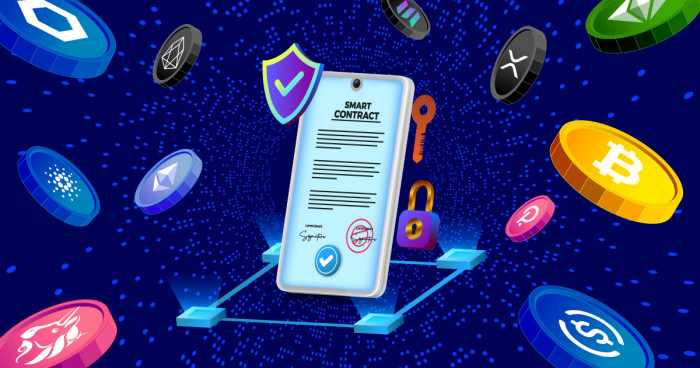Smart contracts are the backbones of DeFi protocols. Therefore, it is crucial to have vulnerability-free smart contracts. What can be the best way to do it other than smart contract auditing?
Some of you might be curious about auditors' tools to audit a smart contract, while others might be interested to know why auditing is important.
These are some of the questions that we will address in this article. So, let's get started. Let us delve into smart contracts' intricacies, relevance, and more.

What Are Smart Contracts?
Nick Szabo introduced the term 'Smart Contracts' in the year 1996. It is a simple piece of data and coding located on a certain address within the blockchain network.
There are some pre-defined criteria according to which the smart contract executes. Eventually, it was integrated into Ethereum and other blockchains of the same nature. It would be beneficial to protect the blockchain against hackers and other bad actors. Simply said, while smart contract auditor cannot guarantee complete protection against code errors or security problems, a smart contract security audit will unquestionably greatly lower the likelihood of such occurrences.
Importance Of Smart Contract Security Audit
Now and then, we hear news about crypto stealth worth millions and billions of dollars. Smart contracts are prone to hacking, resulting in irreparable damage. Even the minutest errors in coding will hamper your crypto space. The effect would increase day by day unless we take some remedial measures by relying upon a credible smart contract auditing company.
To prevent hackers from stealing crypto assets that cannot be replaced at any cost, smart contracts must be completely error-free because they deal with money. It is preferable to pay for a Smart contract audit than to become a target of online criminals.
These are some of the reasons why auditing is important for smart contracts.
With this, you will be able to optimize the codes better.
It helps in preventing hacks and crypto thefts.
Auditing helps improve the performance of smart contracts
It enhances the security of dApps.
Do you know how massive are the effects of a smart contract exploit? Here are a few examples of the greatest hacks due to vulnerability in smart contracts.
Ronin Network- $624M loss
Wormhole- $326M loss
Nomad Bridge- $190M loss
Beanstalk- $181M loss
Harmony Bridge- $100M loss
These are just some of the hacks that have happened lately. There are over hundreds and thousands of such attacks that happen every day. Thus, it's the need of the hour to get your smart contracts audited. If you fear the amount of time invested in this process, let us introduce you to some smart contract auditing tools to automate this process.
Auditors conduct this process manually or use specific tools to automate the process. While it takes more time to go line-by-line manually, compared to the other auditing, it is more accurate. On the other hand, when auditors use tools to perform an audit, it consumes less time and is more effective.
Which Tools To Use To Audit Smart Contracts?
Auditors utilize various technologies to examine their customers' smart contracts. It seems sensible to have questions regarding which tools to choose from the variety that is now accessible.
These are some of the tools that are popularly used to audit smart contracts.
Slither
This smart contract security tool was created by Trail of Bits and released in 2018. Python 3 was used to create a static analysis framework for Solidity.
With Slither, programmers may better understand their code, uncover flaws, and quickly create specialized analyses. This tool performs several vulnerability detectors, gives users access to an API to create custom assessments, and prints all visual information about the contracts' specifics.
Echidna
Testers and auditors use the popular smart contract fuzzing tool Echidna. It is a Haskell software created exclusively for testing Ethereum smart contracts using a property-based approach (fuzzing). Using complex grammar-based fuzzing campaigns based on a contract ABI, it falsifies user-defined predicates or Solidity assertions.
Securify
ChainSecurity and the Ethereum Foundation collaborated to create Securify. It is capable of analyzing smart contracts using solidity versions starting at 0.5.8.
This tool's fully automated security analyzer for Ethereum smart contracts has proven to be a godsend for auditors.
Mythril
One of the most often used tools in the sector is this one. Consensys created Mythril in Python, which is simple to set up using a Package installer for Python (pip). This tool's usage of many cutting-edge methods, including taint analysis, symbolic execution, and others, is among its most intriguing features.
Manticore
Manticore is another well-known symbolic execution-based technique for identifying holes in smart contracts. The ability of this tool to scan x86/64 and ARM binaries, in addition to Ethereum-based applications, is its most exciting feature (smart contract binaries). The utility has already been entirely developed in Python and may be found in the usual Python repository.
Is Cryptocurrency Safe?
Blockchain technology is typically used to create cryptocurrencies. Blockchain explains how transactions are time-stamped and recorded into "blocks." A digital record of bitcoin transactions is created as a result, which is difficult for hackers to alter despite being a complicated, technical procedure.
Transactions also need a two-factor authentication procedure. To begin a transaction, you could be required to enter a login and password. The next step may include entering an authentication code provided to your mobile phone via SMS.
Even when security measures are in place, cryptocurrencies can still be compromised. Several costly cyberattacks has severely hit cryptocurrency start-ups.
Therefore, auditing smart contracts and deploying them on the blockchain is the need of the hour if you do not wish the security of your cryptocurrencies to be compromised.
Final Thoughts:
Many IT teams may need clarification while doing a security audit or pentest of their smart contracts due to the more complicated nature of blockchains and smart contracts. Additionally, owing to a lack of understanding of a good implementation caused by the scarce and dispersed resources regarding the technology, the IT teams may become stuck throughout the audit process, wasting time and resources for your company.
















